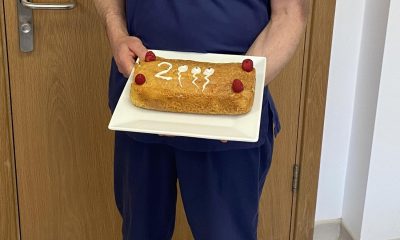Two COVID-19 patients have received heart and lung transplants
"It is through pushing boundaries like these that discoveries - and medical advances - are made."
Published
2 years ago onBy
Talker NewsBy Mark Waghorn via SWNS
Heart and lung transplants have been carried out on two patients who suffered severe COVID-19 infections.
The virus mainly affects the lungs but can also damage many other organs - including the heart, kidneys and brain.
Now doctors have revealed the first successful heart transplant in a 31-year-old Brazilian man.
He was still recovering fromCOVID-19 - but it was his best chance of survival.
"It is through pushing boundaries like these that discoveries - and medical advances - are made,"said Dr. Eduardo Mocsari, of the Hospital Israelita Albert Einstein in Sao Paulo.
The case was presented at a medical conference in Munich - where another team reported on a man of 61 suffering from COVID-19 who received two new lungs.
More than 110,000 heart transplants have been performed around the world since Christiaan Barnard performed the first procedure in 1968.
But doctors remain concerned about carrying out transplants on patients carrying new diseases.
COVID-19 is no exception, with little known about the outcome of heart transplants in patients who have had the virus.
Dr. Mocsari, who was among the surgeons who carried out the op, said it illustrates they can be successful.
The unnamed patient had been diagnosed with cardiomyopathy two years earlier.
The genetic condition led to heart failure where insufficient blood is pumped round the body.
"Heart transplantation after COVID-19 infection is something new and we are still learning about the risks and complications," said Dr. Mocsari.
"In this case, the patient hadn't fully recovered and we were concerned his Covid would worsen.
"Several studies have indicated transplant patients are at greater risk of more severe Covid and of dying from the disease.
"But, as his heart was still deteriorating, we decided that the transplant gave him the best chance of survival."
The man was being prepared for a heart transplant when he tested positive for COVID-19 during admission.
His heart failure continued to worsen, despite being treated with high doses of drugs and a surgically implanted mechanical pump.
He had a left ventricular ejection fraction - a measure of how well the heart is pumping - of 15 percent. A normal result is 50 to 70 percent.
The procedure was postponed as the patient went on to develop a fever and respiratory failure - for which he was put on a ventilator.
This was followed by cardiogenic shock - a life-threatening condition in which the heart suddenly can't pump enough blood to meet your body's needs.
He was put on ECMO (extracorporeal membrane oxygenation) - a machine which replaces the function of the heart and lungs.
His heart continued to deteriorate. The transplant was carried out on May 4 after his breathing improved - 42 days after he was diagnosed with COVID-19.
The patient was testing negative for COVID-19 at that point but still required a ventilator and ECMO and the team wore full PPE during the transplant.
The five-hour operation went smoothly and, with his new heart working well, the patient no longer needed a mechanical pump.
He then spent 20 days in intensive care and was discharged from hospital just over to months later.
Some of his toes had to be amputated due to tissue death, or necrosis.
He will take immunosuppressant drugs for life to prevent the new organ from being rejected.
Dr. Mocsari says a transplant is the gold standard surgical treatment for heart failure that isn't responding to other therapies.
COVID-19 adds an extra layer of risk. As a result, doctors have been hesitant about carrying out heart transplants on COVID-19 patients.
"As this case illustrates, despite there being few reports in the literature, heart transplantation in patients who have had severe COVID-19 can have a favorable outcome,"Dr. Mocsari said.
"There are situations, where despite all the unknowns, a transplant is the best option.
"It is through pushing boundaries like these that discoveries - and medical advances - are made."
Currently, the patient is hospitalized due to abdominal infection. He has responded well to treatment and is on his way to be discharged.
He has requested not to be identified due to the stress of recovery.
Meanwhile, in Lisbon a Portugese patient's lungs were irreparably damaged by COVID-19.
He contracted the virus in January and was discharged from the Central Hospital of the University of Lisbon in August.
The man had a history of high cholesterol and gastritis. He was put on a ventilator but deteriorated with severe breathlessness.
He required advanced lung support therapy - including spending two and a half months on ECMO.
He suffered multiple infections including pneumonia and swelling of the prostate gland - as well as blood clots.
"About 75% of the patient's lungs had been scarred by COVID-19, and it was clear from his scans that his lungs were permanently damaged, and would not recover,"said anaesthetist Dr. Carolina Almeida.
"The patient qualified for transplant because he was young and strong enough to survive the risky procedures, and no other organs had been impacted by Covid-19.
"After careful clinical evaluation, he received the life-saving organs in May."
The surgery took about seven hours and involved two weeks of post-operative intensive care. His lung function is now good and he no longer requires daytime oxygen support.
"The team are hugely grateful that the surgery went so well and that the patient made it home to continue rehabilitation close to his family,"said Dr. Lurdes Castro, a senior anaesthesiologist who helped perform the transplant.
"It requires enormous willpower to overcome everything he has endured, and it is wonderful to have played a part in giving this patient the opportunity to live again and return to his family and previous life."
He has had to overcome numerous challenges on the recovery journey including an irregular heart rhythm, a collapsed lung, subcutaneous emphysema in which air becomes trapped under the skin, type 2 diabetes and several infections.
He will have to take more than a dozen medications for the rest of his life to prevent organ rejection and infections.
"Lung transplantation is a lifesaving treatment for a carefully selected group of COVID-19 patients whose lungs have been irreparably damaged by the virus and who are strong enough to undergo major transplant surgery,"Dr. Almeida said.
"But given the impact of COVID-19 worldwide, and the increasing number of younger, healthier patients affected, the number of transplant candidates is likely to increase considerably.
"That number could grow to include COVID-19 survivors whose lungs may deteriorate over time."
Both cases were presented at Euroanaesthesia in Munich - an annual meeting of the European Society of Anaesthesiology and Intensive Care.
Stories and infographics by ‘Talker Research’ are available to download & ready to use. Stories and videos by ‘Talker News’ are managed by SWNS. To license content for editorial or commercial use and to see the full scope of SWNS content, please email [email protected] or submit an inquiry via our contact form.
You may like
Other Stories


Shop owner discovers Victorian jail cells hidden in her basement
She purchased the store having no idea about it history.


Scientists explain why there are ‘spiders’ on Mars
The creepy crawlies are actually small, dark features that form when this happens.


Doctor celebrates 2000th vasectomy with a sperm-themed cake
He says he hopes to raise awareness about the procedure.


Dog theft causes same emotional turmoil as losing a child: study
Some felt the loss was even more intense than the death of a friend or relative.


New innovative submarine looks just like a UFO
It has been specifically designed for the cruise and hospitality sectors.
Top Talkers

 Parenting1 week ago
Parenting1 week agoSingle mom details struggles of feeding her 12 kids

 Lifestyle7 days ago
Lifestyle7 days agoWoman regrets her tattoo nightmare: ‘It’s horrendous’

 Wildlife3 days ago
Wildlife3 days agoClever elephant returns visitor’s shoe that fell into enclosure

 Good News3 days ago
Good News3 days agoDisabled student takes first steps in 10 years on graduation stage

 Health4 days ago
Health4 days agoNew study reveals ‘old age’ begins later than it used to

 Broadcast1 week ago
Broadcast1 week agoHow hard is it for Americans to live sustainably?

 Environment1 week ago
Environment1 week agoHow hard is it for Americans to live sustainably?

 Work2 days ago
Work2 days agoHow much does your workspace affect productivity?

